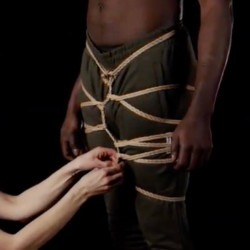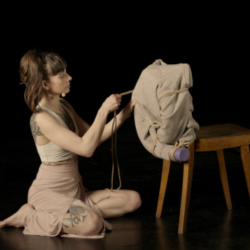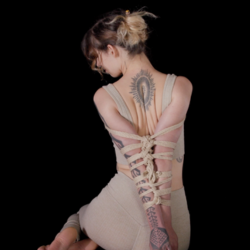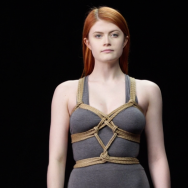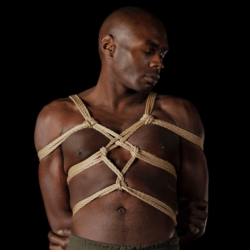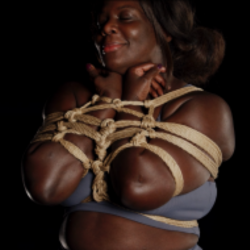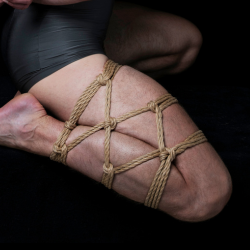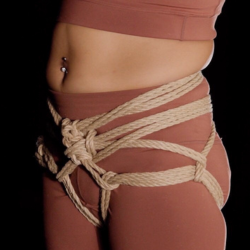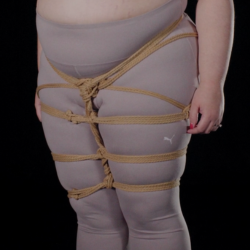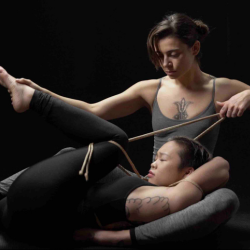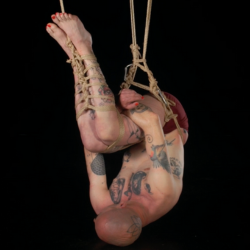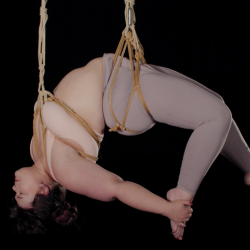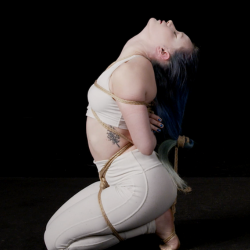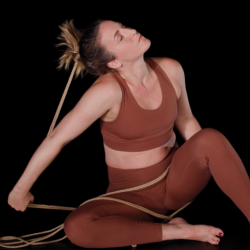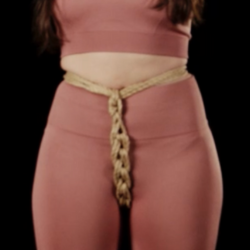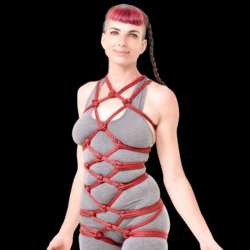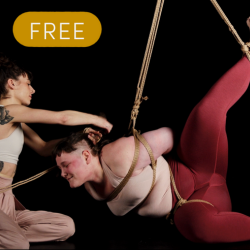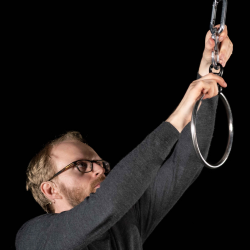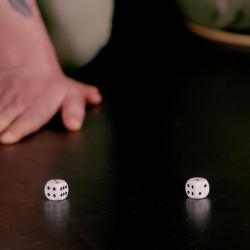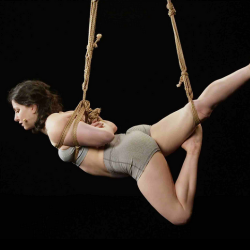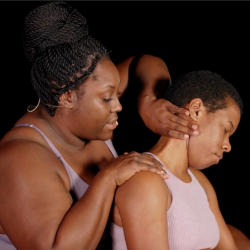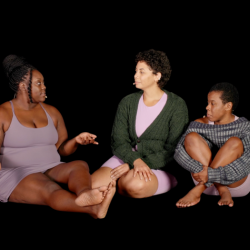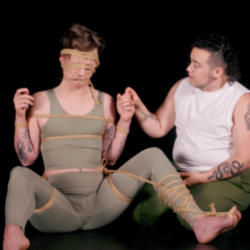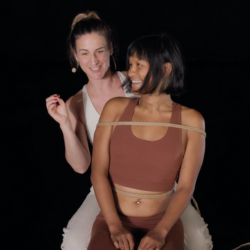EP 45
OJI PAN
According to Oji Pan, it’s essential to give people the space to authentically manifest their values. In this episode, Oji Pan discusses the art of rope, its history, and the challenges men face in expressing vulnerability. He also highlights the Devil Mask Society’s inclusive approach, exploring themes of shame, ego, and deeper connections through rope practice.

Oji Pan (he/him) has been involved in kink and BDSM, in one form or another, for over adecade. He has rigorously been studying rope for over 10 years and his work is heavily influenced by the work of Akechi Denki, Nawashi Kanna, and Hajime Kinoko.
Instagram: @_oji_pan_
[00:00:10] Wicked Wren Greetings to all my guys, gals and non-binary pals. Welcome to the Shibari Study Podcast. I'm your host, Wren. Shibari Study is an online learning resource offering video tutorials for beginners through advanced practitioners. Whether you're brand new to the world of shibari and needing to learn the basics, or a seasoned rigger or rope bottom seeking inspiration to push your practice to new places, there's something for you at shibaristudy.com. Today I'm talking to Andrew. You'll know Andrew as OjiPan online. Andrew uses he/him pronouns. He's a rope switch, an instructor and a "raconteur". I have no idea what that word means and I've debated saying it in the intro.
[00:00:54] Oji Pan I'm a provocateur.
[00:00:55] Wicked Wren A "provocateur"?
[00:00:55] Oji Pan I like to provoke.
[00:00:57] Wicked Wren Now a "raconteur".
[00:00:59] Oji Pan Yeah.
[00:00:59] Wicked Wren What does that mean?
[00:01:02] Oji Pan In my mind, it is sort of like I am a rambling, uncommitted, open-minded seeker of fun and provocation.
[00:01:15] Wicked Wren I am now more unsure of what that word means.
[00:01:18] Oji Pan Perfect. It's better. It's better that way, I think. Living the ambiguity.
[00:01:23] Wicked Wren You really should. There are some words I just hear that I can't actually center in myself and learn what they mean. Sending a "provocateur". It's another word. It's just a very cool word. But I don't think anybody really knows what that means.
[00:01:36] Oji Pan One who provokes.
[00:01:38] Wicked Wren But what does that mean, though?
[00:01:39] Oji Pan Well, I mean, provocateur has had a lot of different meanings that could artistically mean provoke somebody to think about art in a different way. Provocateurs were also used in espionage to provoke things like riot or dissent in a country.
[00:01:53] Wicked Wren Who were some of your favorite provocateurs throughout history? I'm just curious.
[00:01:56] Oji Pan Oh, wow. So that's interesting idea, provocateurs in history would be...
[00:02:02] Wicked Wren Or media.
[00:02:03] Oji Pan Or in media. Oh, Christopher Hitchens was one. I would also argue somebody like, Lars von Trier, who's a filmmaker, was purposefully provocative. I would, oh, man, I'm blanking out on artists.
[00:02:19] Wicked Wren Well, that's not a... Go on.
[00:02:21] Oji Pan There's this specifically queer painter from the UK, Francis Bacon was a provocateur.
[00:02:26] Wicked Wren Well, we have to talk about rope bondage, or else Shibari Study is going to be quite upset at me. With that, how did you get into real bondage, where did it start?
[00:02:35] Oji Pan So bondage for me started at a very young age, like it was something that I was curious about before I even knew what (…) was, and then became attached to (…) as I went through puberty. And then I went through the weird stages of trying to understand what that meant about me, trying to find people that I wanted to engage with it, with, trying to find people who are understanding, not judging of that thing, and then sort of getting deeper and deeper into wanting to learn more about it.
[00:03:04] Wicked Wren You were, you were like a kid when this happened.
[00:03:07] Oji Pan Oh, I used to try to convince my babysitters to tie me up and leave me in the closet.
[00:03:14] Wicked Wren How did you try to convince them to do that?
[00:03:17] Oji Pan By tell- by telling we were going to play like a kidnap game or tell 'em we're going to play like, like all of the cops and robbers games that kids try to play, that suddenly make them realize like, Oh, I'm into bondage. I tried, but it was me trying to convince somebody older than me to do that thing.
[00:03:32] Wicked Wren It'd be like, I got got, I'm here.
[00:03:35] Oji Pan I'm so easy to catch. Oh, no, I've been caught. Oh, no. Whatever will happen to me.
[00:03:39] Wicked Wren It's like better do the time, right? Right?
[00:03:40] Oji Pan Exactly. I have (…) around. It is time for me to find out now.
[00:03:44] Wicked Wren I think we all have stories like this, and I definitely do. And when I think of them, there's a lot of shame associated with them. I have stories of, I had a friend that I used to convince to put me into a dog cage and kick the dog cage. There's all these crazy things and there's more stuff, but I'm still really shameful, of those things.
[00:04:07] Oji Pan I somehow, and I don't know what the answer to this is, but I somehow was able to excise that portion of me, and I really don't have a lot of shame when it comes to those things. When it comes to desires or things that I want or things that I like, those things tend to not form in a shameful way for me.
[00:04:28] Wicked Wren Did that stop at some point? Was that like a switch?
[00:04:32] Oji Pan I don't know that it ever existed. I've been pretty extroverted and pretty performative through the bulk of my life, and I was a kid who would, like, I would talk to, I would just strike up conversations with strangers, and I would, like, I didn't have that embarrassment thing. And I think that there's an internal portion of me that always existed in a place that was, this is a thing that is pleasurable and it is not hurting anyone else, so why would I be ashamed of it?
[00:05:01] Wicked Wren Was your family really cool?
[00:05:03] Oji Pan I mean, I guess it depends on how you would define cool. I'm a child of multiple divorce, so my mother's have 4 or 5 husbands. And there were a variety of sort of different things in those husbands. So, there was a variety of different sort of male influences in my life and sort of the singular steady influence of my mother. My mother was, you know, A) raising me on her own, B) very generally liberal and liberated woman in sort of like the, the first, first wave feminist, sort of definition of that thing. So didn't spend a whole lot of time worried about me being embarrassed or her being embarrassed about things.
[00:05:46] Wicked Wren That make sense. You are great in social situations. That's the first thing I think of when I think of you. You are really great at navigating a room. You know everybody.
[00:05:57] Oji Pan I try to-- I think that is a function less of making me feel comfortable, and more of making others feel comfortable. Giving everyone in a room at least one person they know is going to help them be a little bit more authentic and comfortable in the environment that they're in, and hopefully facilitate them meeting more people. So yeah, that's, it's really weird because if I am in a room of a bunch of people I don't know, I kind of cease being that thing.
[00:06:26] Wicked Wren Do you really?
[00:06:27] Oji Pan Yeah, yeah, yeah. Yeah.
[00:06:28] Wicked Wren Okay. I guess I've never seen you in a place with strangers. Wow.
[00:06:36] Oji Pan Stranger danger. Stranger danger.
[00:06:39] Wicked Wren You're also a switch. And you're a dude. And there aren't as many switches that are dudes in the world.
[00:06:47] Oji Pan I think that's a misnomer. I think that [00:06:48]there are a lot more people that are switches that are dudes. [2.2s] But to go back to our earlier conversation, I think that there is a lot of misunderstood shame, and misplaced ideas around what it means to be a man or what it means to be a gender at all. And all of the things that different societies have wrapped up in those definitions that doesn't allow people that associate in that way to be in spaces where they are vulnerable, but it also preempts them from being in spaces where that they they're empowered by that vulnerability. And that's something that I'm like super into, like as a bottom.
[00:07:30] Wicked Wren Do you think there's anything we can do with the spaces themselves to allow men to feel okay expressing themselves? What do you think that barrier is? Is it an internal thing that you have to go on on your own time?
[00:07:47] Oji Pan I don't know that it is-- so, okay, I'm going to make a wild statement. [00:07:56]There aren't a whole lot of... Non queer, all male spaces. [6.5s]
[00:08:04] Wicked Wren Yes. Yes. Yes. Yes.
[00:08:07] Oji Pan And I think that [00:08:08]that limits male ability to interact with people in a non -people of the same (…) or of the same gender- in a non (…) way. [12.1s]
[00:08:21] Wicked Wren Yep.
[00:08:21] Oji Pan And so you go into cis spaces and het spaces, and you will oftentimes see women less stressed, less clothed, more comfortable in exhibiting their sexuality with each other. There are a lot of sort of like het play parties and (…) parties in and around Los Angeles area that you'll go to, and it's like totally cool and chill for women to make out. But like, you never see dudes making out, you never see dudes touching each other. Even in, like, non-(…), interactive ways. And I think that that leads to a standoffishness or a discomfort in being the first person to be seen in that light.
[00:09:07] Wicked Wren Yeah. Yeah, the patriarchy hurts everybody.
[00:09:10] Oji Pan Man. Boy, does it.
[00:09:11] Wicked Wren It really does. It's hard for trans people also, because once trans men transition, they lose community and they're like, oh, this is it? Where iis the support system. And then all y'all are like, this is it. Welcome, brother.
[00:09:28] Oji Pan Welcome to, welcome to you holding it all deep inside you until it becomes a white hot ball of blind rage that you somehow need to exert on the world in one of many stoic fashions. It's the dumbest (…) ever.
[00:09:41] Wicked Wren It is. I talk to my boyfriend a lot about this, and dating is one of the only ways that he's able to meet friends. There's you can go to meetups for different hobbies and things like that, but it's so different if you don't get your friends from college or some other obscure hobby that you have.
[00:09:59] Oji Pan And I think that in some ways, rope is like one of those obscure hobbies that allows people to connect outside of the business of doing capitalism. And really create connections and affinities amongst each other that all of those [00:10:13]things are happening, oftentimes within a (…) context, can be non-(…). [4.6s]
[00:10:21] Wicked Wren Things are happening within a (…) context, but can be non-(…).
[00:10:24] Oji Pan Yeah. So you're you're at a play party or you're at a class or you're at some sort of rope jam or something like that, and you're interacting with other people that are doing rope regardless of what their gender is. And it puts you in a position where you start to relate about the thing that you're doing is a doorway into creating long standing relationships that kind of verge away from that. And that in a lot of ways is like, not to turn the discussion, but that, a lot of ways, is like where Devil Mask Society came from. It was a group of people that started out being interested in rope, but our interest in rope turned into, Oh, we're interested in all of these other things together. We're interested in going to nice restaurants. We're interested in having good cocktails. We're interested in going to movies. We're interested in cooking together. We're interested in sort of all of these other things, going to museums or going to events or hanging out. And that, to me is kind of the difference between in rope, what is, what exists as sort of like learning in educational environments, and then what becomes community that gets built by people who have started off with rope as a baseline, but have grown to entangle themselves in so many other ways in their lives.
[00:11:33] Wicked Wren Yeah, rope is a really all consuming thing in most people's lives.
[00:11:36] Oji Pan Yes, it can be. Well, I mean, and it's not... I think the difference is that it's not just rope. It's not allowing rope to consume all of those things, but allowing it to be the gateway to open up the doors to other things and other connections in other ways to have a more whole and authentic relationship with someone.
[00:11:53] Wicked Wren Yeah, you brought up Devil Mask Society, and I did not say this in your intro, but for everyone out there, Andrew, what would you say your relationship with Devil Mask is?
[00:12:03] Oji Pan So Devil Mask Society broadly is an anarchist rope collective that exists somewhere around Los Angeles and the broader world. It is a grouping of people that is interested in creating access to rope knowledge broadly. That might be through teaching, that might be through events, that might be through a whole variety of things. It isn't led by anyone. It encompasses a lot of people, and it is very amorphous on purpose. If there are no leaders, there is no sort of authority to abuse.
[00:12:37] Wicked Wren [00:12:37]How do you have an organization and move it forward, but do not have a leader or a structure? [7.8s]
[00:12:45] Oji Pan [00:12:45]You create opportunities for people to engage in the values that you have agreed upon. [6.7s]
[00:12:53] Wicked Wren That sounds like it takes a lot of thought, a lot of planning. You have to be very clear about the goals and objectives that the group's doing, so people know how to fill in those holes.
[00:13:07] Oji Pan I feel like you need to be clear about the values, and then you need to let, you need to give people the space to manifest those values in ways that are authentic to them. So it doesn't necessarily have to like, if I am, Cool, I want to create accessibility to knowledge about rope bondage. I don't need to tell people to do it in the way that I think accessibility should work. I should give them that value and let them, and then empower them to like, Cool. You want to open a space or you want to teach classes, or you want to go here or you want to learn this thing. How can I help? It's really coming to it with, like, How can I help?
[00:13:45] Wicked Wren It sounds like a true collective.
[00:13:47] Oji Pan Sort of; it's almost not even that formal. There's always a weird thing where people will come to myself or one of my partners or other people that have been associated with Devil Mask Society historically and ask the question of like, Well, how do I join? And the response is always, I don't, I don't know, how do you join?
[00:14:08] Wicked Wren You're in.
[00:14:09] Oji Pan And, and yeah. And and it literally is a thing of like well, When, when can I say that I'm in? and I'm like, You can say that you're in right now. But understand there are preconceived values about what the group is and what it's about. And if you say, I am this thing, there are going to be a whole bunch of people who start asking you questions about the way you inhabit those values when you operate in public spaces.
[00:14:34] Wicked Wren We all have a little Devil Mask in us.
[00:14:36] Oji Pan I mean, you could.
[00:14:39] Wicked Wren [00:14:39]How have you seen the collective change over the years? [4.4s] Has it gone through a lot of ebbs and flows where new people have come in and new interest has been brought in?
[00:14:51] Oji Pan Yeah. I mean, I think it's... It started out as a fairly diverse group, which was great. It has gotten more diverse as a group, which is great. I think if there were any wish that I had for change, it would be that more people felt comfortable... Taking it on and using it like, like, for... Not for nothing, but all it really is, is a name. And it's a name that can be imbued with the power that people give it, but they need to pick it up and imbue it with that power, right? And I wish there were more people that we've been involved with that feel comfortable in doing that thing. Like organization is hard. Organizing in, in community is hard. Organizing in Los Angeles is hard with the costs that are involved in all of those things. But if there's a thing that I support, it is as many people as possible that don't look like me being able to pick up that name and do things with it, because I think that that's what it's meant to be used for.
[00:15:52] Wicked Wren You're a very systematic person. You seem to be someone that likes process. You seem to be somebody that assigns a lot of process to things.
[00:16:04] Oji Pan I feel like I am reliant on process, and I feel like I'm reliant on process because inside me is a chaos gremlin.
[00:16:11] Wicked Wren I love it.
[00:16:12] Oji Pan And if I don't put the shackles around the gremlin, nothing will ever be accomplished.
[00:16:19] Wicked Wren And in order to shackle that gremlin, you made a rules for rope at some point.
[00:16:26] Oji Pan Oh, so this is still very early in my rope... Let's call it journey. Like the first year or two when I started. And when I say this, like, I refer this as, like me taking rope seriously, like me genuinely putting effort into learning beyond just, I'm going to buy a book and try to figure things out on my own. I put some specific sort of guide rails around the things that I would or wouldn't do, and they were around things like, Cool, I'm going to take – and they were arbitrary – I'm going to take X amount of time before I suspend somebody, I'm going to take Y amount of time before I perform. I'm going to take Z amount of time before I teach. I'm going to... Like, I'm not going to take photos for these reasons. I'm not going to do this for these reasons. I'm going to try to eschew the things that... The ego things that people use rope to gratify, as an active way to figure out of like, Cool, is this a thing I really want to devote my time into interior, like, like for my interior. I'm not doing it for anybody else. If I have these guide rails, I will have time to explore and figure out, like, is this genuinely a thing or is it a thing because of the attention it brings to me?
[00:17:39] Wicked Wren I definitely want to talk about that. That's huge. But before we get there, how many of those rules did you stick to? All of them or did they change?
[00:17:49] Oji Pan No, I stuck to all of... Oh, so I guess, I guess there's, there's a semantic argument of what it means to like, teach. Like, like is, is TA-ing for someone in a class teaching, right? So there were some semantic close calls that I would say, but generally I held to all of those for that amount of time.
[00:18:09] Wicked Wren And you said arbitrary. And I just think it's interesting to say you did pick arbitrary timelines, but you were true to staying with those arbitrary timelines. That's a very cool thing.
[00:18:20] Oji Pan Yeah. I mean, I think it is... It's... I like to say that they are arbitrary, because often times people with authority in and around rope will say you should never x until y. You shouldn't do this until you do this. [00:18:35]And everyone's journey is different. Everyone needs to understand the responsibility and accountability that they have for the outcomes that they create, either when they are tying or being tied, but that pathway, someone's understanding, their capability of learning. All of those things vary so hugely that any timeline is an arbitrary timeline. [23.0s]
[00:18:58] Wicked Wren Also, their life experience, the lens that they're looking at through life. You brought up ego and doing something that's authentic to yourself. You said you audited if this is an experience that I'm really doing for Ojipan, or am I doing this because of the attention that it brings me?
[00:19:16] Oji Pan Yeah. I mean, I think there's an easy path for a lot of people in... The way that we socialize and interact now, that has a lot to do with how other people perceive us. Like we want our photos for the Instagram baby. We want our sweet TikToks. We want to get those likes and comments and subscribes and all of those things. But I think that you end up... Everything becomes work and nothing becomes fun anymore. And for me, I am lazy generally. But generally terrified in sort of being caught up in this cycle of constantly needing to do something to produce.
[00:20:04] Wicked Wren Caught up in the cycle of needing to produce. Do you feel that when you're producing, you feel like you're growing, or do you feel like you're... Like what emotion is tied to producing for you?
[00:20:16] Oji Pan It's not even that there's an emotion tied to producing, it's that is a... I think culturally such an enforced, outlook for people there is a constant like, It is Sunday. I'm sitting on the couch doing nothing. I could be spending my time being productive. I have this long list of things that I can do. And ultimately the consistent need for... It is construed with being productive as being self bettering or self-improving. And those things aren't necessarily a 1 to 1. My life will be better if I don't sit on the sofa every Sunday. My, my whatever, like people's impression of me if I'm constantly busy will be that I am successful.
[00:21:02] Wicked Wren Yeah. Yeah. And in actuality, if you're constantly busy, you're not successful. The idea of being busy is that you aren't managing your time very well.
[00:21:12] Oji Pan Or you're just, you're so distracted by so many things because you are constantly multitasking that you're not doing anything singularly well.
[00:21:23] Wicked Wren It is funny. Rope in general does fast track attention. You brought up wanting likes and all those kinds of things. It's intoxicating. It's hard.
[00:21:34] Oji Pan Yeah, and it's also a... There's a genuine amount of effort that it takes to be good at it. And one thing I love about rope is that it is like super democratizing, in the sense that there is no fast track to having that knowledge. I can't, I can't pay to suddenly know how to do rope bondage. I can, like, I can pay to have access, but access isn't practicing. Like, the only, the only way I can ultimately be good at this is through a devotion of time. Which nearly, I mean, the access to time is certainly dependent on people, socioeconomic status and the cultures that they live in and the challenges that they experience. But it is something that is much more available to everyone than currency.
[00:22:25] Wicked Wren Yeah, absolutely. With Devil Mask, you teach an entire cell on history.
[00:22:35] Oji Pan So we teach a class on history. Cells... Cells are sort of a cohort of people that experience learning as a group over an amount of time. So we do teach a class about history primarily because – for two reasons. One, I want our students to have aesthetic influences that exist out of outside of the things that I like. I don't want people to tie like I tie, I want people to tie like they want to tie. And two, because one of my contentions is like, there is nothing new under the sun. Everything that is sort of popular or fashionable in rope bondage has existed 60 years ago or 40 years ago or 30 years ago, and we just don't necessarily know about that stuff.
[00:23:22] Wicked Wren Yeah. We're really obsessed with old stuff. We're really into lineages and the proper way of doing it and terminologies and stuff like that.
[00:23:32] Oji Pan I think for me, and this is this is going to be one of my [00:23:34]ropotics. [0.0s] I think me for me, [00:23:38]the idea of a lineage or a style is 100% a function of both misogyny and capitalism. [7.8s] Because 90%, more than 90% of the people that exist that have a style that you can name. So if I said name a style off the top of your head, all of those would be names of men.
[00:24:00] Wicked Wren Oh, yeah. Yes.
[00:24:02] Oji Pan And generally where that comes from, at least in my interpretation of it, is that for people who are not men, who are tying rope and tying rope professionally, they're doing it as part of a (…) trade. They're professional mistresses. They're professional service workers. That is the place that they primarily make their money. And in order to do that, their work needs to be reflective of the needs of the person that they are tying. They can't be precious about their style because they have to do the thing that the client is interested in in order to be successful. For men, there are less opportunities that exist like that. So the places that they tend to make money are things like performances or films or photoshoots, or instruction. And in order to differentiate yourself in a market of a whole bunch of men who want to do that thing, it behooves you to have a distinct perspective. It behooves you to have a distinct, visual style. It behooves you to have a distinct and expressible philosophy. So all of those things are a function of a way to market yourself as separate from the other people that are competing for the same capital that you are.
[00:25:09] Wicked Wren It's a really cool, hot take. And one of the things that stands out is generally in the world we offload the labor of education to women. Women are generally seen as teachers. When you think about your kindergarten teacher, it's always a woman, but in rope, it's not that.
[00:25:26] Oji Pan Generally, our cultures do not reward men to be teachers in the same way they do to be teachers of rope.
[00:25:35] Wicked Wren I wonder if there is a – and I'm going to use this word very lightly – fame involved with this. There's a notoriety that's involved with teaching rope that doesn't exist in teaching other stuff.
[00:25:51] Oji Pan There's social capital that exists in rope, and it's not I mean, you can call it fame, but we're a subset of a subset of a subset of a (…), and it gets you access to a whole lot of things. It gets you access to people to tie, it gets you access to places to go, it gets you access to events and places where you want to be seen.
[00:26:07] Wicked Wren How do you think history plays a positive role in someone's learning? Like what good can we take from studying things?
[00:26:18] Oji Pan Assuming there's sort of two bits. Bit number one is that we run the risk oftentimes of repeating things that we should have learned from the first time. The ways we've learned and changed over the time that I've been involved broadly in rope, our understanding of things like, risk and injury, of things like, consent and the nuances around it, of things like what it means to tie and be tied have consistently and considerably grown. But they grow almost like, you're ironing a shirt so they grow a little bit, and then they grow a little bit more, and then they grow a little bit more. But if you're not paying attention, the things that we have grown past can crop up again or crop up in different ways, or crop up in different subsets of people. So cool, like observing sometimes like local queer community having problems with consent that were things that I saw in the rope community eight years ago about consent and the arguments sort of being the same. I kind of wish those learnings like, I wish those learnings would have cut off the trauma and the pain that people experience, so they didn't have to deal with things like that. The second thing that I think it's important to learn from our history is that there are often things that we have abandoned as ideas. I sort of refer to them as like the vestigial limbs or the, the appendixes of rope bondage, which are like these ideas that people.... Sort of wanted to put in usage, but there wasn't like a use case or an interest in them at that time. That in going back and looking at those things suddenly become valid. One of the things that I'll point back to is, it's pretty popular right now to tie a chest harness that is broadly known as a tengu. So sort of arms to the side back, right? My first understanding of where that tie came from came from like a late 90s video, from a school called [00:28:22]BakuYukai, [0.4s] that featured a Japanese instructor named [00:28:25]Akechi Denki, [0.2s] who has since passed away, and a Japanese instructor named [00:28:30]Miura Takumi. [0.4s] And it was the first time I had ever seen somebody tie someone in that arm position. Ten years go by. 15 years go by. However long. That video comes to America. People see that video and start adopting that arm positioning. People start tying that arm positioning more and more. It starts to develop and it becomes a thing. Long after it had ceased being part of the popular vernacular. And so being able to look back, if it's five years, if it's ten years, if it's 20 years, if it's 40 years, if it's going all the way back to sort of the the origins of people being tied up can be really valuable as a place to sort of push the craft and the art forward, because if all we do is repeat the things that are given to us, we are in a closed room, just making the same art over and over again. And as a provocateur and a raconteur, it is important to consistently blow up art and remake it.
[00:29:26] Wicked Wren I appreciate you bringing us back to the beginning there. It is a funny version of gatekeeping that rope has, because like you said, you can't buy the ability to tie something. That's all time put in and that comes with other baggage there. But it is hard to actually find these videos in these sites and know where to look, where the, where things are documented.
[00:29:54] Oji Pan And you have to be able to speak multiple languages, and you have to be able to connect with the right people who get you access to them. And this is the broad nature of the problem with the historicity of this stuff, and anything and everything that has been associated with (…) work. Midori talks a lot about this. There are a lot of people that certainly know much more about history than I do. But because the nature of rope bondage is inherently buried in the idea of black and gray market economies, has been utilized so much by (…) workers and is so oriented in that world, there was not a cultural willingness to sort of save and archive all of these things. So it becomes difficult, even if you know what you're looking for, to find those things.
[00:30:40] Wicked Wren It feels like we're in a time, we're in a wave right now, where we're trying to take something that's existed in the fringe and make it mainstream. And it does go against a lot of the ethos of what the thing is.
[00:30:59] Oji Pan I don't know that I 100% agree with that statement. I think that... If bringing it into the mainstream is against the ethos of its origins as (…) work, that's because we haven't brought (…) work into the mainstream, not the other way around. It's the, it's the, the back and forth that people always say where they'll say like, Well, I don't really like to suspend because it's less connective than tying someone on the floor. Well, if you can't suspend someone and connect with them, that's not a problem with suspension. That's a problem with you.
[00:31:32] Wicked Wren Yeah. You've been doing rope for a long time. We've interacted a ton. We're both in LA. I would say you're in my scene. I am very fond of you and your whole cohort, but I've never seen you tie personally, I suppose, in like, a play session. How do you approach rope?
[00:31:53] Oji Pan Part of the reason that you were less likely to have seen that, and part of the reason that you haven't seen like, I'm not somebody that ties with a lot of people. I'm not somebody that's interested in... Tying with a lot of people. For me, rope is a high context interaction. It is something that I both need to, when being tied and with tying, I enter into a very vulnerable space, and people often don't necessarily pay attention to the vulnerability around the act of time. But to tie someone means to start off by saying I want dot, dot, dot. I want you in this position. I want to move you in this way. I want you to experience this physical sensation. I want this to be tight. I want it to be loose. I want you to suffer. I want you to find a pleasure. And as a top to start to say I want something can be met with I don't want it. It defines who you are and it says something about yourself in the thing that you choose. And so for me, that is like in a lot of ways has become more and more, the more I've done this, a lot more of a sacred and vulnerable space. And so I don't... A) I don't have as many people that I can do it with where it's rewarding. And B), I don't find that space as often as I once did.
[00:33:11] Wicked Wren You talked about vulnerability. And do you think that goes back to being a man who is a top? I've never heard a man that's tying somebody say, This is very vulnerable for me.
[00:33:22] Oji Pan I don't think... So, I don't think it is necessarily inherent to gender. I think one of the challenges that people broadly have these days is sort of being able to commit themselves to desiring something. This is a thing that I want. This is a thing that will please me. And the guilt around like having that thing. And when it comes to tying, that is now a choice that you have made. And I don't know that people think about it or contextualize it that way. But all of the choices that you make as somebody who is tying somebody else are inherent statements about who you are and what you want.
[00:34:04] Wicked Wren You brought up the guilt around having something. Do you think that that guilt makes it... A little more (…) in a way?
[00:34:16] Oji Pan It's interesting.
[00:34:17] Wicked Wren Does it add a layer?
[00:34:21] Oji Pan It's, it's interesting. It can. I think it is another... Directionality to play with. I think that it's one of those things that once you name it and make it explicit, becomes a dynamic that you can play with.
[00:34:34] Wicked Wren Yeah. Earlier you mentioned rewarding. You said something like, You're not going tie with any people because you don't know if that's going to be a rewarding experience for you. What is a rewarding experience and what does that look like?
[00:34:49] Oji Pan So, there is, I believe that one of the reason, the reasons that people are more and more attracted to rope, both from a tying and a being tied standpoint, and continue, it continues to become more popular, so sort of the mainstreaming of it, it goes back to that idea that we all have a lot of things running through our heads all the time. We are all multitasking. We are all worried. We are all anxious. We are all concerned. We are all planning. We are all doing a whole lot of things in our little lizard brains all at one time. For me, one of the great pleasures of tying and one of the great pleasures of being tied is that it is a unafocused activity. For me, a successful scene is one in which there is a moment where, regardless of where I am, be it in a crowded room, or be it in my home alone, everything else drops away from me. Everything else goes away from me. I enter sort of this liminal space where it is me and that person and the choices that we are making, and we are each other's audience that does a thing that very few other activities in the world do. It allows you to be seen. It allows you to see someone else. It allows you to engage in physical touch with them in a way that is singularly focused in such a way that people do not have access to it in their day to day lives. And once people feel that once people get to that space, that that is the place where they're like, Oh, this is the thing that I want about this experience. This is what is fulfilling for me. And now I'm chasing that experience of being singularly seen by another person.
[00:36:34] Wicked Wren Does it matter to you if you're alone or in a crowd? Does that add? Take away?
[00:36:41] Oji Pan I think that that is a discussion that has to happen with the person that I'm tying with. So there are oftentimes I'll have discussions with my partners where I'm like, Cool, what does this scene vibe feel like? And they're like, Cool, let's do some show off-y (…). And it then becomes like the two of us are playing with each other, but we're also playing with the crowd and we're playing with our expectations. We're playing with what we think they want to see and what we are willing to show them, and sort of subverting those things. That is a different dynamic. But we've, we've named it. We've made it explicit. We've said, this is the thing that's going to – we're both going to derive pleasure for. And it's different than one in which we are each other's audience. But we've said, this is what this is going to be for us to enjoy. Let's do that thing and do that thing wholeheartedly.
[00:37:31] Wicked Wren Speaking of audience, how do you feel about the camera?
[00:37:35] Oji Pan So I'm not a big person who likes pictures. And this, this actually might be a place where I am more, embarrassed, more vulnerable. I tend to not like images of myself a whole lot. I tend to like images of my partner a whole lot. I tend to find that photos of scenes or tying, I have a, I have a history in doing theater, like plays, and I always found photos of performances of plays to look very stagy and unrealistic. And I often time find photos of rope to be really staging unrealistic. Like, they're a singular image that is sort of meant to describe a whole variety of things that cannot be captured by a camera.
[00:38:20] Wicked Wren What are some photos that you like? Are there any that stand out that you can think of? You're like, Damn, that's a good one.
[00:38:25] Oji Pan I mean, I can talk about people's general work as photographers that I like. So I like people like Dave and Clover, I like Sugiura Norio...
[00:38:33] Wicked Wren What is about them though? What do they get?
[00:38:37] Oji Pan They tend to be evocative of something in their staging and lighting and approach, and, and, and Dave and Clover and Sugiura are very close to each other in, in the way they do this, that brings a narrative that goes beyond just the rope.
[00:38:53] Wicked Wren Do you feel like when you're tying you're expressing like an artistic side of yourself? Or is it only about connection with that other person?
[00:39:05] Oji Pan I think that I have aesthetic opinions. I think that I have opinions about what are beautiful. And I think that part of my interaction in a scene with my partner is to be gratified in seeing a thing of beauty. And it is up to my capability and skill to arrange whomever I'm interacting with in a position that I find, or a pattern, or a form, or any of those things that I find aesthetically pleasing. And there are sort of layers of these things, right? There's the ability to connect with somebody. There's the ability to create something that is aesthetically pleasing. There's the ability to really enjoy each other as an audience or really enjoy an interaction with an audience outside the two of us. It's a very rare instance where, like, all of those things will meld together in, in a thing. So for me, I tend to default to, I need to get the connection part right. So that is sort of the primary idea and kind of anything that comes outside of that. Like, if I'm getting 2 or 3 of those things, right, like that is a banner day for me. I'll tell you a secret, provocative secret. I don't think I'm terribly good at rope. I don't think I'm terribly good at teaching. What I think I am is somebody who is too dumb to quit at doing things. And if I say I will be at a place and I say I will do a thing come hell or high water, I will be in that place and do that thing.
[00:40:33] Wicked Wren Showing up is the most important part.
[00:40:36] Oji Pan It's wild.
[00:40:37] Wicked Wren It's like 80% of the thing.
[00:40:39] Oji Pan Yeah. I mean, in the ten years that we've been teaching the cell classes, the only thing that has ever interrupted us from having a class was Covid.
[00:40:49] Wicked Wren Wow. And then you probably did those online as well.
[00:40:52] Oji Pan We didn't actually, at that time we took a break. Part of, part of... Even though we are currently with this cell... Posting the videos of our classes on YouTube, previously the entire... Sort of philosophical idea of those classes were to be an in-person experience.
[00:41:13] Wicked Wren That makes sense. My last question here for you, Mr. Andrew, is if you had to bring it down in a ratio of how often you get tied, how often you tie. What does that spread look like?
[00:41:24] Oji Pan That is probably like 80% tying, 20% getting tied.
[00:41:29] Wicked Wren Do you wish you got tied more?
[00:41:33] Oji Pan Of course, I think anyone who, I think anyone who gets tied, anyone who enjoys being tied. If you asked any of them, Oh, would you like to get tied more? I don't know that anyone would say, Certainly not!
[00:41:45] Wicked Wren It's so funny because when I scour your Instagram, as I do often, the- some of the only photos of you are when you're tied.
[00:41:58] Oji Pan I mean, maybe that's the place I like seeing myself best in some ways? Or I think, okay, maybe it's not an issue of the place that I like seeing myself best. I think it is the place where I can endure the discomfort of being seen in order to produce an image that is atypical of what everyone else is seeing.
[00:42:16] Wicked Wren I would also say that it's hard to take a picture of a rope top and make it flattering. Like, rope top face is a real thing. Whenever I'm photographing a scene, I will sometimes even chop out a head of a, of a top because it's so difficult. There's always faces.
[00:42:38] Oji Pan There's, there's a reason that magicians always wear black. There's a reason that rope tops, historically have always worn a lot of black. It's because... In a lot of ways... People who are not them, people who are not the two people that are tying, the thing that they are interested in is the person having a thing done to them, or the action that is happening, and not the person that is doing it.
[00:43:06] Wicked Wren Yeah. You're right. Well, where can people find you, Andrew?
[00:43:12] Oji Pan So generally, people can find me on Instagram, at ojipan_. They can also find me on FL at Ojipan. They can also find me in the Shibari Study Discord under Ojipan.
[00:43:27] Wicked Wren Nice.
[00:43:28] Oji Pan And running around Los Angeles, right now, like a chicken with my head cut off because one of my partners is about to open a new rope studio in Los Angeles.
[00:43:37] Wicked Wren That's incredible. I want to talk about that. And everyone, I feel like there will be another episode where we chat about the rope studio, the new rope studio in LA.
[00:43:45] Oji Pan Woo!
[00:43:46] Wicked Wren Woo!


